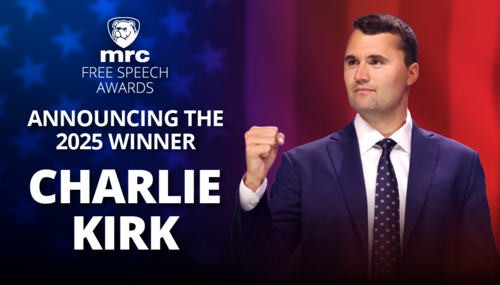With Immigration and Customs Enforcement continuing nationwide arrests and deportations, the liberal media have hysterically cranked up the hysteria. On Tuesdays, CBS Mornings Plus, for example, they claimed some illegal immigrants are “avoiding health care” in fear of being arrested by ICE...as if that will suddenly stop ICE from upholding the law.
The left-wing media want people to put illegal immigrants first by being empathic to their struggles. Co-host Tony Dokoupil began, “Now hospitals are preparing employees on what to do if ICE agents show up in the middle of care.” Does CBS think that ICE agents will show up in the middle of a heart surgery, and take the illegal immigrant being operated away?
Dokoupil asked CBS News medical contributor Dr. Celine Gounder if the raids in hospitals have started yet or if it is fear circulating rumors, to which she claimed:
As for official raids by ICE, that is still something we are waiting to see if we're going to have that happen. But we are seeing ICE agents in health care facilities. They are often bringing in people that they've detained for medical clearance. We see this often with law enforcement, but it is creating an atmosphere of fear. And my colleagues and I have had numerous patients tell us that they hesitated or waited too long to come in for health care. So, if you're talking about a heart attack, you're talking about heart muscle when you're delaying care. When you're talking about a stroke, you're talking about brain cells, when you're delaying care. So those delays really matter.
Long story short, Gounder confirmed that ICE agents have not shown up at the hospitals, but they are “creating an atmosphere of fear.” Obviously, no one should have to be in fear about getting necessary medical treatment, but the liberal media twist the narrative towards the illegal immigrants rather than applauding the ICE agents.
Another person who was covered in the segment was Hannah Janeway, an emergency medicine physician operating in different hospitals across Los Angeles, who stated:
Many times they're arriving with ski masks and looking very intimidating to the general patient who you might find in the emergency department. This is affecting the overall health of the community because it's creating an atmosphere of fear in the emergency department instead of an atmosphere of wellness.
Ironic that the person who advocated for “an atmosphere of wellness” goes by they/them pronouns and in 2018, co-founded Refugee Health Alliance at the U.S.-Mexico border, where the company believes in the "abolition of barriers” according to their website.
So yes, CBS Mornings Plus chose a person who is against ICE agents and worked with illegal immigrants to cover this segment on health. No bias at all here.
Gounder continued to empathically advocate for the illegal immigrants:
Well, if you think about who has come here as an immigrant, many of them have faced real trauma in their home countries. It could be physical violence, sexual assault, any number of things. And so, this kind of really what feels like militarization of an emergency room can be very retraumatizing cause some very real mental health impacts.
Again, why did CBS Morning Plus support the care of people who are in this country illegally rather than give respect to the ICE officers who put their lives on the line to protect the nation? Bring back news channels that tell the facts and do not twist the story to fit their narrative.
Click here for the transcripts.
CBS Mornings Plus
7/8/25
9:34 a.m. EasternTONY DOKOUPIL: All right, time for today's health watch. As the Trump administration continues its push to detain undocumented migrants, some of them say they are avoiding health care, even necessary health care, out of fears over ICE raids. Well, now hospitals are preparing employees on what to do if ICE agents show up in the middle of care. Here to explain is CBS News medical contributor Dr. Celine Gounder. She's also the editor at Large for Public Health at KFF. And Doctor Gounder joins us now. Thank you very much for joining us. Is [sic] this happened yet or is this just fears of this happening kind of the raids while care is being provided at a hospital?
CELINE GOUNDER: As for official raids by ICE, that is still something we are waiting to see if we're going to have that happen. But we are seeing ICE agents in health care facilities. They are often bringing in people that they've detained for medical clearance. We see this often with law enforcement, but it is creating an atmosphere of fear. And my colleagues and I have had numerous patients tell us that they hesitated or waited too long to come in for health care. So, if you're talking about a heart attack, you're talking about heart muscle when you're delaying care. When you're talking about a stroke, you're talking about brain cells, when you're delaying care. So those delays really matter.
JO LING KENT: You spoke with an emergency physician in Los Angeles, where I live, where ICE agents are bringing in detainees who need medical care. Let's listen to that.
[CLIP]
HANNAH JANEWAY [they/them pronouns]: Many times they're arriving with ski masks and looking very intimidating to the general patient who you might find in the emergency department. This is affecting the overall health of the community because it's creating an atmosphere of fear in the emergency department instead of an atmosphere of wellness.
[BACK TO LIVE]
KENT: So how else are you hearing ICE impacting patient care in L.A.?
GOUNDER: So that was Doctor Hannah Janeway. They are an emergency medicine physician working in a number of different hospitals in the Los Angeles area. Doctor Janeway told me that ICE agents have insisted on all kinds of, frankly, ethical violations. So not showing their identification, not identifying themselves, wearing a ski mask, along with green fatigues and a bulletproof vest in the E.R. while patients are being seen, not accommodating the need for patient privacy during an interview and examination, preventing doctors from contacting family for necessary medical information or preventing family from visiting, so these are really standard things that every patient should have the right to these kinds of provisions for good health care.
KENT: In addition to the physical health. I mean, what is the medium to long term impact on mental health of these patients with this kind of fear?
GOUNDER: Well, if you think about who has come here as an immigrant, many of them have faced real trauma in their home countries. It could be physical violence, sexual assault, any number of things. And so, this kind of really what feels like militarization of an emergency room can be very retraumatizing cause some very real mental health impacts. And we've heard of also even children and families being impacted by their older relatives not being able to seek care.
DOKOUPIL: What are the obligations of patients when they show up at the hospital? Do they have to show an I.D.? Do they have to identify themselves?
GOUNDER: No. So in fact, we have a quote, Jane Doe or John Doe on the emergency room board all the time. So, you know, if you pick up a homeless person on the street who needs medical care, they may not have an I.D. In fact, a lot of patients don't have an I.D. That's not who needs to be presenting I.D. It's if you're a law enforcement official coming into a hospital or health care facility, you need to be identifying yourself as such. You need to be showing your badge or your I.D., and that is -- you know, if you want to be going into patient, private patient areas. You also need to be showing a judicial warrant. And that is not being consistently done.
KENT: Do you expect to see quickly, you know, any ,,,pushback in the courts on this?
GOUNDER: Well, I think the problem is a lot of health care providers don't know what their rights are, and they need to be saying, you know, where's your I.D., where's your warrant, turning into risk management for advice in the hospital if they need that, and documenting thoroughly as we would in any complicated medical or legal situation, documenting those encounters thoroughly.
KENT: Doctor Celine Gounder, thank you so much for your reporting. We appreciate it.




